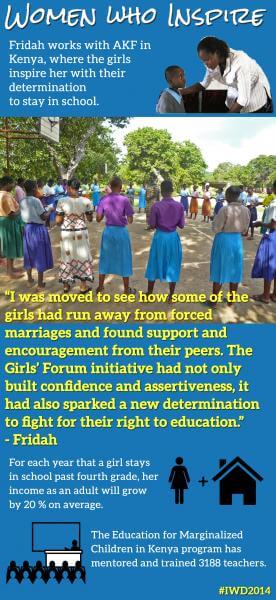This blog is the first in our series of stories of “Women Who Inspire” for International Women’s Day 2014.
 Fridah Mathembe works to make education a reality for some of the most under-served children in East Africa: girls. She is a Communications Specialist with the Education for Marginalized Children in Kenya (EMACK) program of the Aga Khan Foundation (East Africa), with funding from the U.S. Agency for International Development.
Fridah Mathembe works to make education a reality for some of the most under-served children in East Africa: girls. She is a Communications Specialist with the Education for Marginalized Children in Kenya (EMACK) program of the Aga Khan Foundation (East Africa), with funding from the U.S. Agency for International Development.
Fridah is inspired by the girls and women she works with. Enhancing girls’ participation in education is an essential element in EMACK’s approach. Through its program for marginalized schools and groups, Aga Khan Foundation (AKF) has trained education officials, teachers and community members, equipping them with skills and knowledge to create a gender-friendly learning environment. This includes establishing Girls’ Forums, groups within schools where girls take part in debates and other activities that promote their skills and self-esteem.
Fridah has visited these forums and spoken with girls who have overcome great barriers to make a positive impact in their communities.
“While visiting a Girls’ Forum in Hara Primary school, Garissa County in North Eastern province, one of the members asked me what challenges I had to overcome in order to excel in my academics, and whether I thought they were capable of excelling too. I explained to them the obstacles I had overcome, and I saw their zeal for education rekindled through the Girls’ Forum initiative. Each girl narrated her challenges. I was moved to see how some of them had to run away from forced marriages and they found support and encouragement from the other girls and the forum patron. I noticed that even though they had to overcome certain cultural practices (early marriages, and female genital mutilation, for example) they were determined to do well and break the cycle of poverty that faced many women in the region.”
Fridah continued, “The girls asked to be visited by more women who had gone through similar challenges in order to share their experiences. At that point, I realized that the Girls’ Forum initiative had not only built confidence and assertiveness in the girls; the forum had also sparked in the girls a new determination to fight for their right to education.”
For each year that a girl stays in school past fourth grade, her income later as an adult grows on average 20 percent. Additionally, girls’ education means better health for the community at large: where girls receive five years of school, child survival rates rise 40 percent on average.
“Our programs are impacting parents, teachers and pupils’ lives by encouraging innovation and full participation in improving learning outcomes,” notes Fridah. “When even a small percentage of parents and teachers take the programs seriously, the results are evident in children’s learning outcomes. This inspires me to keep doing this work!”